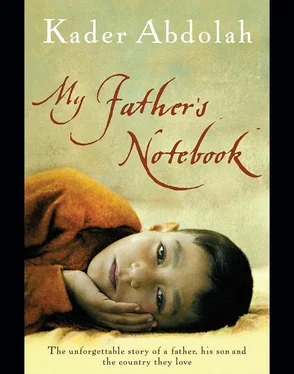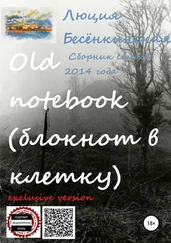I walked past your house and
Sat on the roadside with a flower
In my hand as you passed by.
God knows I shall never forget you .
Reza Shah wanted more. He wanted to change women’s lives overnight. From one day to the next, women were forbidden to wear chadors. Whenever they went out, they were expected to wear hats and coats instead.
He wanted everything to happen quickly, which is why he governed the country with an iron hand and stifled all opposition. On his orders, the poet Farokhi had his lips sewn shut because he’d recited a poem about women who stumbled and couldn’t walk without their chadors. During Reza Shah’s reign, many writers, intellectuals and political leaders were thrown in jail or murdered, and others simply disappeared.
According to the opposition, Reza Shah was a lackey of the British Embassy in Tehran and had been ordered to modernise the country for the benefit of the West. In the eyes of the imperialists, he was merely a soldier, a pawn to be used in the struggle against the Soviet Union.
Whether or not he was a British puppet, one thing is certain: he wanted things to change. In his own way, he was determined to radically reform the country, but he was a soldier, a brute. Everyone was terrified of him.
Reza Shah hoped that his most important projects would be finished before his son succeeded him.
The train was one of his pet projects.
During the twenty-five hundred years in which various kings, sultans and emirs had ruled the Persian Empire, no government official had ever come to the mountains to take a census of the inhabitants. Now that Reza Khan was shah, however, he wanted his subjects to carry identity cards.
Throughout the ages the imams had controlled the mountains and the countryside. Now the populace had to contend with a gendarme, a man in a military cap emblazoned with one of Reza Shah’s slogans, a man who answered to no one but His Majesty.
Reza Shah needed an army that obeyed him unquestioningly. And that army needed soldiers whose names and dates of birth were listed on identity cards. So, for the first time in history, the exact number of boys in Saffron Village was recorded. The vital statistics were entered in a book, which the gendarme kept in his cupboard.
Thanks to Reza Shah, Aga Akbar also was issued with an identity card. At last, his full name was officially on record.
• • •
To realise his great dream, Reza Shah ordered that a railway be built from the southernmost part of the country to its northeastern border. Right up to the ear of the giant Russian bear, to be exact. He knew that the Europeans had the most to gain from this route, but he also knew that the rails would be left behind long after those Europeans were gone.
The railway tracks crept through the desert, over the rivers, up the mountains, down the valleys and through the towns and villages until they finally reached Saffron Mountain.
The iron monster started to climb the mountain, but was forced to stop halfway, when it came to the historic cave with the cuneiform inscription. The building of the railway had disturbed the cave’s eternal rest. More importantly, the engineers were afraid that if they blasted through the rock with dynamite, the cave would collapse.
The cuneiform inscription, their ancient cultural heirloom, was in danger. The engineers feared it would crack. They panicked. The chief engineer didn’t know what to do. He didn’t dare take a single risk. He knew the shah would have him beheaded if anything went wrong.
With trembling hands, he sent a telegram to the capital: CANNOT PROCEED WITH RAILS. CUNEIFORM BLOCKING ROUTE.
The shah read the telegram, hopped into his jeep and had himself driven to Saffron Mountain. After a long night’s drive, the jeep stopped at the foot of the mountain. The local gendarme offered the shah a mule, but he refused. He wanted to climb the mountain himself. Early in the morning, before the sun had struck the mountain peak, Reza Shah stood at the entrance to the cave. Wearing a military tunic and carrying a field marshal’s baton under his arm, he checked on the progress of his dream.
• • •
“What’s the problem?” he asked.
“Your Majesty—” the chief engineer began, trembling. He didn’t dare go any further.
“Explain it to me!”
“Th-th-th-the rails have to go past here. I’m afraid that … that … that …”
“Yes?”
“I–I-I would like Your Majesty’s permission to … to … to relocate the cuneiform relief.”
“Relocate it? Shut up, you stupid engineer! Find another solution!”
“We’ve done all the cal-cal-cal-culations, checked out all the options. No matter how we do it, the dynamite could destroy the cave.”
“Find another route!”
“We’ve explored every alternative. This is the best route. The others are virtually impossible. We could make a huge detour, but …”
“But what?”
“It’ll take longer.”
“How much longer?”
“A number of months, Your Majesty. Six or seven months.”
“We haven’t got that much time. We can’t lose a day. Or even an hour. As for you — get out of my sight, you idiot! ‘Impossible’— is that the only word you engineers know? Six or seven months? You must be joking!”
Furious, the shah marched into the dark cave. Outside, no one dared to move. After a while he came out again. He looked down at the hordes of peasants — young men who’d climbed up the mountain to catch a glimpse of Reza Shah. When they saw him emerge from the cave, they leapt onto the rocks and began to shout, “Jawid shah! Jawid shah! Jawid shah!”
The shah thrust his field marshal’s baton under his arm and slowly made his way down the mountain. Just as the gendarmes were about to chase away the peasants at the bottom, a group of elders from the surrounding villages appeared. Dressed in their most festive garments, they walked towards Reza Shah, carrying a bowl of water, a mirror and the Koran. When they were a hundred yards away, the oldest man threw the water in the direction of the shah and the other men bowed their heads.
“Salaam, sultan of Persia!” the man exclaimed. “ Salaam , God’s earthly shadow!”
He knelt and kissed the ground.
“Come forward!” commanded the shah, pointing his baton at the place where he wanted the old man to stand.
“Listen, graybeard! I don’t need your prayers. Use your head and give me some advice. That idiot of an engineer doesn’t know how to route the railway track. How can I get the train past the cave without doing any permanent damage?”
The old man turned and went back to confer with the others.
After a while he came back.
“Well?”
“For centuries our fathers have built houses here on Saffron Mountain, using only a pick-axe and spikes. No one has ever damaged the mountain. They chipped away the rock only in places where it was absolutely necessary. If Your Majesty wishes, I will call together all of the young men in the village. They will clear a path for your train.”
A look of relief spread over the shah’s face. Then it clouded over again.
“No, it’ll take too long. I don’t have that much time. I want it done fast.”
“As Your Majesty wishes. In that case, I will call all of the young men on Saffron Mountain and, if necessary, all of the young men from the neighbouring mountains. We have experience, we know the mountain. Give our men the opportunity to prove themselves.”
The shah was silent.
“Give us the strongest pick-axes in the country.”
“And then?”
“Then we will clear a path, so the train can go around the cave and reach the other side of the mountain.”
That evening the muezzins from all the villages called from the roofs of their mosques, “Allahu akbar. La ilaha illa Allah. In the name of Allah, our forefathers and Reza Shah, we call on all strong men. Hurry, hurry, hurry to the mosque. Whatever you’re doing, stop right now and hurry to the mosque.”
Читать дальше












